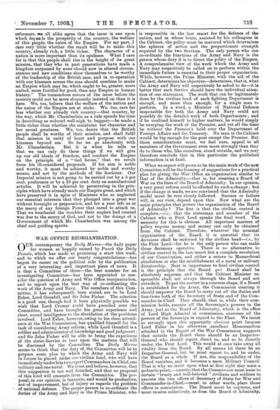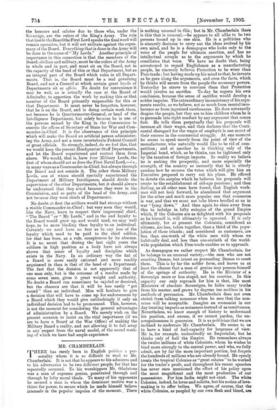WAR 'OFFICE REORGANISATION.
flUR contemporary the Daily Mirror—the daily paper kJ for women so happily named by Punch the Daily Female, which has made so promising a start this week, and to which we offer our hearty congratulations—has begun its career on the political side by the publication of a very interesting and important piece of news. It is that a Committee of three—the best number for an investigating Committee—has been appointed to con- sider the question of Army and War Office reorganisation, and to report upon the best way of co-ordinating the work of the Army and Navy. The members of this Com- mittee, it has subsequently been stated, are to be Lord Esher, Lord Grenfell, and Sir John Fisher. The selection is a good one, though had it been physically possible we wish that Lord Cromer could have presided over the Committee, and have brought his great experience and clear, sound intelligence to the elucidation of the problems involved. Lord Esher, however, owing to his close attend- ance at the War Commission, has qualified himself for the .task of considering Army reform; while Lord Grenfell is a soldier and administrator of knowledge and good judgment; and Sir John Fisher will be able to bring the experience of the sister-Service to bear upon the matters that will be discussed by the Committee. The Daily Mirror seems to think that the duty of, the Committee will be to prepare some plan by which the Army and Navy will in future be placed under one civilian head, who will have immediately under him two expert Commanders-in-Chief, one military and one naval. We trust and believe, however, that this suggestion is not well founded, and that no proposal of this kind will emanate from the .Committee. The pro- posal, in our opinion, is fantastic, and would be productive, not of improvement, but of injury as regards the problem of national defence. The proper person to co-ordinate the duties of the Army and Navy is the Prime Minister, who is responsible in the last resort for the defence of the nation, and in whose brain, assisted by his colleagues in the Cabinet, the policy must be matured which determines the spheres of action and the proportionate strength required by the two Services. The only person who can co-ordinate the functions of the Army and Navy is the person whose duty it is to direct the policy of the Empire. A comprehensive view of the work which the Army and Navy may respectively be called on to perform within the immediate future is essential to their proper organisation. While, however, the Prime Minister, with the aid of the Cabinet, determines his objective—determines, that is, what the Army and Navy will respectively be asked to do—it is better that each Service should have the individual atten- tion of one statesman. The work that can be legitimately done by the civilian head of each fighting Department is enough, and more than enough, for a single man to perform. In a word, a Minister of National Defence responsible for both the Army and Navy could not possibly do the detailed work of both Departments ; and if he confined himself to higher matters, he would simply be usurping the work of the Premier, and yet all the time be without the Premier's hold over the Department of Foreign Affairs and the Treasury. No man in the Cabinet would be big enough for the post except the Premier. But these considerations must, we feel sure, appeal to all members of the Government even more strongly than they do to those who, like ourselves, stand outside, and we may therefore conclude that in this particular the published information is at fault.
What we expect will prove to be the main work of the new Committee will be the framing of suggestions for a practical plan for giving the War Office an organisation similar to that of the Admiralty,—that is, for creating a Board of War on the lines of the Board of Admiralty. In our opinion, a very great reform could be effected by such a change ; but if the change is made, we are convinced that the Admiralty model must be very closely followed. Success or failure will, in our view, depend upon this. Now what are the main principles that govern the organisation of the Board of Admiralty ? The first is that the civilian control is complete,—i.e., that the statesman and member of the Cabinet who is First Lord speaks the final word. The necessity for this is obvious. All important matters of policy require money, and money can only be obtained from the Cabinet. Therefore, whatever the nominal organisation of the Board, it is essential that its decisions shall be endorsed by the civilian head—i.e., by the First Lord—for he is the only person who can make those decisions operative. There is no alternative to civilian control in the last resort but a complete revolution of our Constitution, and either a return to Monarchical absolutism or else the establishment of a naval or military dictatorship. Next in importance to final civilian control is the principle that the Board quit Board shall be absolutely supreme, and that the Cabinet Minister re- sponsible shall act always through the Board and not outside it. To put the matter in a concrete shape, if a Board is established for the Army, the Commission creating it should empower the Board to carry out all the duties and functions both of the Secretary of State and of the Com- mander-in-Chief. They should, that is, while their com- mission holds, execute all the Sovereign's powers in the Army, just as the Board of Admiralty, which is the office of Lord High Admiral. in commission, exercises all the powers of the Sovereign in regard to the Fleet. We insist so strongly upon this apparently obvious point became Lord Esher in his otherwise excellent Memorandum attached to the Report of the War Commission suggests that outside the Board there should be an Inspector. General who should report direct to, and so be directly under, the First Lord. This would at once take away all vitality from the Board. By all means let there be an Inspector-General, but he must report to, and be under, the Board as a whole. If not, the responsibility of the Board vanishes, and it becomes a mere Military Council. That is why we insist upon what at first sight may seem a pedantic point,—namely, that the Commission must issue to certain "trusty and well-beloved" civilians and soldiers to execute the two offices of Secretary of State for War. and Commander-in-Chief,—must, in other words, place those offices in commission. The Board must be supreme, and must receive collectively, as does the Board of Admiralty, the honours and salutes due to those who, under the Sovereign, are the rulers of the King's Army. The rule that inside theBoard the First Lord speaks the final word will remain operative, but it will not militate against the supre- macy of the Board. Everything that is done in the Army will be done in the name of" My Lords." Another principle of importance in this connection is that the members of the Board, civilian and military, must be the rulers of the Army in whole and in part, and must sit on the Board, not in the capacity of the head of this or that Department, but as an integral part of the Board which rules in all Depart- ments. That is, the Board must be a real governing Board, and not a Council at which certain great heads of Departments sit ex officio. No doubt for convenience it may be well, as is actually the case at the Board of Admiralty, to apportion the work by making this or that member of the Board primarily responsible for this or that Department. It must never be forgotten, however, that he is on the Board, and is doing certain work there, not because he is Quartermaster-General, or head of the Intelligence Department, but solely because he is one of the persons named by the King in the Commission to execute the offices of Secretary of State for War and Com- mander-in-Chief. It is the observance of this principle which will make the Board an artificial person administer- ing the Army, and not a mere invertebrate Federal Council of great officials. So strongly, indeed, do we feel this, that we would keep the present Headquarter Staff Departments, and let the Board superintend and control them from above. We would, that is, have four Military Lords, the first of whom should act as does the First Naval Lord,—i.e., in many ways as a Commander-in-Chief, but always through the Board and not outside it. The other three Military Lords, one of whom should specially superintend the Department of Military Intelligence, should divide the supervision of the other Departments, but it should always be understood that they acted because they were in the Commission, and so parts of the head of the Army, and not because they were chiefs of Departments.
No doubt at first the soldiers would feel strange without a visible Commander-in-Chief ; but very soon they would, like the Navy, learn to respect their impersonal chief, "The Board" or" My Lords," and in the end loyalty to the Board would grow up, and would tend, we may well hope, to be more binding than loyalty to an individual. Certainly we need have no fear as to any loss of the loyalty which used to be paid to the chief soldier, for that has been, as a rule, conspicuous by its absence. It is no secret that during the last eight years the soldiers in high position as a body have not always shown that sense of loyalty and discipline which exists in the Navy. In an ordinary way the fiat of a Board is more easily enforced and more readily acquiesced in than is that of the head of a Department. The fact that the decision is not apparently that of one man only, but is the outcome of a resolve made by some seven men, gives it great weight and authority. No doubt a Board can sometimes be cajoled or deceived, but the chances are that it will be less easily "got round" than an individual. Men will hesitate to give a decision that will have to come up for endorsement by a Board which they would give unblushingly if only an individual decision had to be pronounced. This, however, is not the moment for considering the general advantages of administration by a Board. We merely wish on the present occasion to insist on the vital importance (if we are to have a Board at the War Office) of making the Military Board a reality, and not allowing it to fall away in any respect from the naval model, of the sound work- ing of which we have had ample experience.































































 Previous page
Previous page